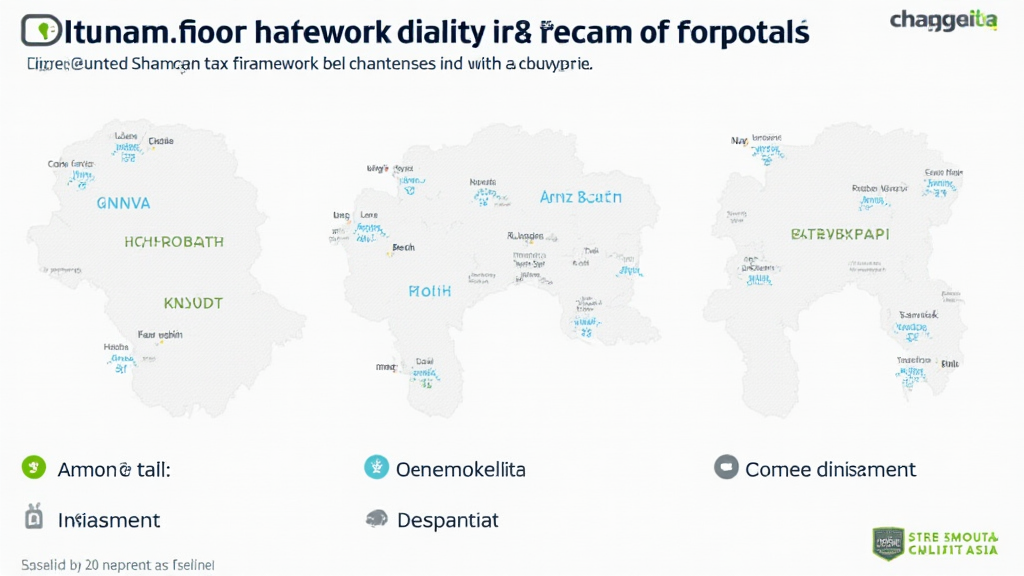Vietnam Crypto Tax Framework Analysis: Navigating the Future
Vietnam Crypto Tax Framework Analysis: Navigating the Future
As the world of digital assets continues to grow, understanding the Vietnam crypto tax framework becomes essential for anyone involved in cryptocurrency activities. With the surge in popularity among Vietnamese users, who are experiencing an annual growth rate of over 60% in crypto engagement, the need for clear tax regulations is evident.
The Importance of a Clear Tax Framework
With billions lost to cryptocurrency-related scams globally every year, establishing a robust tax framework is crucial. This not only protects investors but also fosters a healthier market environment.
- Increased Transparency: A clear regulatory landscape reduces fraudulent activities.
- Market Growth: Compliance boosts confidence among new and existing investors.
- Economic Contribution: Tax revenue from crypto can support national development projects.
Current Status of Vietnam’s Crypto Tax Regulations
As of now, Vietnam’s government has outlined a preliminary framework, but further clarity is necessary. Here’s a summarized overview of the key points:

| Aspect | Status |
|---|---|
| Legal Status | Awaiting finalization |
| Tax Categories | Income tax on profits |
| Tax Rates | Varies based on income brackets |
According to recent reports from the General Department of Taxation (GDT) in Vietnam, engaging in crypto trading may be subject to personal income tax if the transactions yield profit—the basis for developing a comprehensive tax framework.
Key Considerations for Crypto Investors
Here’s the catch: to navigate the Vietnam crypto tax landscape effectively, investors must consider several factors.
- Documentation: Keep accurate records of all transactions to ensure compliance.
- Understanding Tax Liabilities: Profit from crypto trades could be taxed as personal income, impacting overall earnings significantly.
- Future Regulations: Be prepared for changes; discussions are ongoing within the government regarding taxation of NFT and DeFi activities.
Comparison with Other Southeast Asian Countries
Vietnam isn’t alone in establishing a crypto tax framework. For instance, Thailand has implemented a 15% capital gains tax on cryptocurrencies, while Singapore offers a more favorable tax regime with no capital gains tax. Understanding these differences can help Vietnamese policymakers refine their approach.
Practical Steps for Compliance
To stay on top of the evolving tax landscape, consider these practical steps:
- Consult a tax professional with experience in tiêu chuẩn an ninh blockchain for personalized strategies.
- Implement a reliable tracking system for trade records and gains.
- Stay updated on any announcements from the government regarding taxation guidelines.
Conclusion: Embracing the Future
As the discussions around the Vietnam crypto tax framework continue, investors must educate themselves and prepare for upcoming changes. The evolving landscape presents both challenges and opportunities, highlighting the importance of proactive compliance measures.
With potential penalties for non-compliance, understanding the implications of these regulations is crucial. As we move towards 2025, staying informed will enable you to navigate the crypto seas smoothly. For those interested, kindly check out our Vietnam crypto tax guide.
Additionally, leveraging resources such as secure wallets, like Ledger Nano X, can significantly improve security while ensuring you remain compliant with the local regulations.
For ongoing updates on Vietnam’s tax framework relating to crypto, turn to techcryptodigest, which provides expert insights in this rapidly changing environment.
—
By Dr. Hung Tran,
Recognized Blockchain Researcher and Compliance Advisor, published over 20 papers in the field, and led audits for renowned projects like VinChain.





